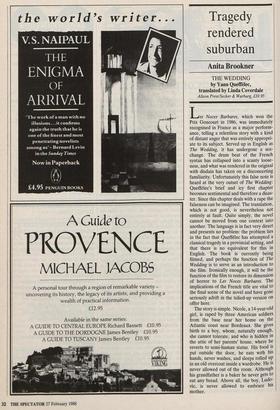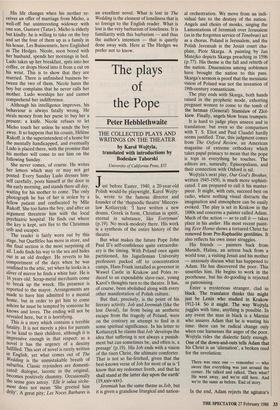Tragedy rendered suburban
Anita Brookner
THE WEDDING by Yann Queffelec, translated by Linda Coverdale
Alison Press/Secker & Warburg, £10.95
Les Noces Barbares, which won the Prix Goncourt in 1986, was immediately recognised in France as a major perform- ance, telling a relentless story with a kind of distant anger that was entirely appropri- ate to its subject. Served up in English as The Wedding, it has undergone a sea- change. The drum beat of the French syntax has collapsed into a scanty loose- ness, and what was rendered in the original with disdain has taken on a disconcerting familiarity. Unfortunately this false note is heard at the very outset of The Wedding: Queffelec's brief and icy first chapter becomes sentimental and therefore a disas- ter. Since this chapter deals with a rape the falseness can be imagined. The translation, which is not good, is nevertheless not entirely at fault. Quite simply, the novel cannot be moved from one context into another. The language is in fact very direct and presents no problem: the problem lies in the fact that Queffelec has attempted a classical tragedy in a provincial setting, and that there is no equivalent for this in English. The book is currently being filmed, and perhaps the function of The Wedding is to serve as an introduction to the film. Ironically enough, it will be the function of the film to restore its dimension of horror to Les Noces Barbares. The implications of the French title are vital to the final scene of the novel and have gone seriously adrift in the tidied-up version on offer here.
The story is simple. Nicole, a 14-year-old girl, is raped by three American soldiers from the base near her home on the Atlantic coast near Bordeaux. She gives birth to a boy, whom, naturally enough, she cannot tolerate, and who is hidden in the attic of her parents' house, where he reverts to semi-human status. His food is put outside the door, he eats with his hands, never washes, and sleeps rolled up in an old overcoat inside a wardrobe. He is never allowed out of the room. Although his grandfather is a baker he never gets to eat any bread. Above all, the boy, Ludo- vic, is never allowed to embrace his mother. His life changes when his mother re- ceives an offer of marriage from Micho, a well-off but uninteresting widower with one son, Gustave (Tatav). Micho is elderly but kindly: he is willing to take on the boy and set the four of them up as a family in his house, Les Buissonnets, here Englished as The Hedges. Nicole, soon bored with her husband, spends her mornings in bed. Ludo takes up her breakfast, spits into her coffee, or drops blood into it from a cut on his wrist. This is to show that they are married. There is unfinished business be- tween the two of them. Nicole hates the boy but complains that he never calls her mother. Ludo worships her and cannot comprehend her indifference.
Although his intelligence improves, his behaviour is always fatally wrong. He steals money from her purse to buy her a present: a knife. Nicole refuses to let Micho touch her unless he sends the boy away. It so happens that his cousin, Helene Rakoff, is the superintendent of a home for the mentally handicapped, and eventually Ludo is placed there, with the promise that his mother will come to see him on the following Sunday.
She never comes, of course. He writes her letters which may or may not get posted. Every Sunday Ludo dresses him- self carefully, posts himself at the door in the early morning, and stands there all day, waiting for his mother to come. The only photograph he has of her is stolen by a fellow patient and confiscated by Mlle Rakoff. She too hates the boy, and after an argument threatens him with the local psychiatric hospital. He finds out where the key is kept, sets fire to the Christmas crib and escapes. The reader is fairly worn out by this stage, but Queffelec has more in store, and the final section is the most surprising of all. Ludo finds his way to the sea and hides out in an old dredger. He reverts to his comportment of the days when he was confined to the attic, yet when he looks in a sliver of mirror he finds a white hair. He is 16 years old. Scrap-metal merchants come to break up the wreck. His presence is reported to the mayor. Arrangements are made to have him admitted to a mental home, but in order to get him to come ashore he must be tempted by someone he knows and loves. The ending will not be revealed here, but it is horrifying. This is a story which contains a terrible fatality. It is not merely a plea for parents to be kind to their children, although it is impressive enough in that respect: as a novel it has the urgency of a destiny fulfilled. This sort of novel is rarely written in English, yet what comes out of The Wedding is the unmistakable breath of suburbia. Classic rejoinders are domesti- cated: dialogue, laconic in the original, becomes positively chummy. Occasionally the sense goes astray. 'Elle le salua seche- ment does not mean 'She greeted him drily'. A great pity; Les Noces Barbares is an excellent novel. What is lost in The Wedding is the element of loneliness that is so foreign to the English reader. What is lost is the very barbarism of loneliness. It is familiarity with this barbarism — and thus the author's intention — that is quietly done away with. Here at The Hedges we prefer not to know.



















































 Previous page
Previous page